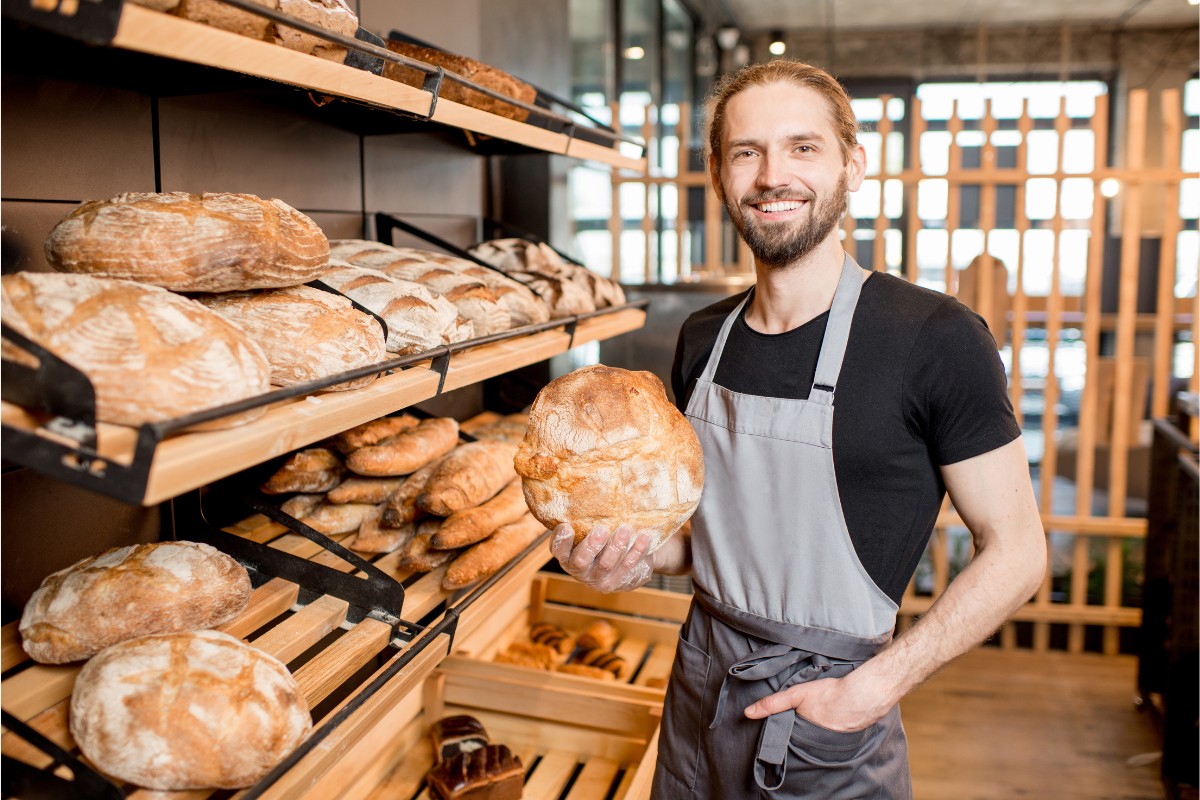If you’re passionate about baking and have considered turning your love for the oven into a thriving business, you’re in the right place.
The sweet aroma of freshly baked goods, the joy of crafting delectable treats, and the satisfaction of building your own brand can be incredibly rewarding.
In this comprehensive guide, we’ll walk you through how to start a home-based bakery step by step, from conceptualization to success.
Post Contents
- 1 How to Start a Home-Based Bakery
- 2 Reasons and Benefits of Starting a Home-Based Bakery
- 3 Frequently Asked Questions
- 4 Conclusion
How to Start a Home-Based Bakery
Here are the fundamental steps of starting your own home-based bakery business.
1. Finding Your Passion and Niche

Before going into the logistics of starting your home-based bakery, you need to understand your passion for baking.
Your love for the craft is the secret ingredient that will set your bakery apart.
Ask yourself what it is about baking that makes your heart sing.
Is it the art of cake decorating, the science of bread-making, or the magic of pastries?
Identifying your true passion will not only fuel your journey but also help you create a unique selling point for your bakery.
Consider what makes your baked goods unique.
Are you committed to using locally sourced, organic ingredients?
Do you specialize in gluten-free, vegan, or keto-friendly options?
Perhaps you have a flair for creating stunning custom cakes for special occasions.
Identifying your niche will help you stand out in a crowded market.
2. Business Planning
Creating a Business Plan
Every successful bakery starts with a well-thought-out business plan.
Your plan should include your bakery’s mission and vision, target audience, pricing strategy, and financial projections.
This document will serve as your roadmap, guiding you through the early stages of your bakery’s development.
Legalities and Permits
To ensure a smooth start, you need to research the legal aspects of running a home-based bakery.
Check with your local authorities and obtain any necessary permits or licenses.
This step will help you avoid potential legal issues down the road.
3. Setting Up Your Workspace
Designing an efficient workspace is crucial for a home-based bakery.
Begin by investing in high-quality kitchen equipment that aligns with the type of baked goods you plan to offer. Consider the layout of your workspace and the flow of tasks.
Having the right tools and an organized kitchen will enhance your productivity.
You might want to include a separate area for preparation, baking, and decorating.
Keep in mind that your workspace should be easy to clean, as hygiene is of utmost importance in baking.
Ensure you have ample storage for ingredients, equipment, and finished products.
As your business grows, you should adapt your workspace accordingly.
You may need additional equipment, more storage space, or even an extra oven to handle larger orders.
Flexibility in your bakery’s layout will allow you to scale up your operations as demand increases.
4. Ingredient Sourcing

The foundation of every delicious baked good lies in the quality of the ingredients used.
To ensure your creations stand out, establish relationships with reputable ingredient suppliers.
Seek local producers and distributors to maintain a consistent source of high-quality flour, butter, sugar, and other essential baking ingredients.
Consider the following tips for ingredient sourcing:
- Local and Organic: Embrace locally sourced and organic ingredients when possible. Not only does this support local businesses, but it can also be an attractive selling point for eco-conscious customers.
- Wholesale Suppliers: Explore options for wholesale ingredient suppliers. Buying in bulk can save you money and ensure a steady supply of essentials.
- Ingredient Quality: Never compromise on the quality of your ingredients. The better the raw materials, the better your end product will be.
- Specialty Ingredients: If your bakery specializes in unique items, such as gluten-free, vegan, or organic baked goods, source-specific ingredients accordingly.
5. Baking Delicious Creations
Once your workspace is ready, it’s time to dive into the heart of your bakery – the delicious creations you’ll be offering.
Your recipes will set you apart and keep customers coming back for more.
The success of any bakery lies in the perfection of its recipes.
Experiment, tweak, and refine your creations until they’re absolutely delightful.
Consistency is key.
Customers come to rely on the taste they’ve grown to love, so it’s essential to maintain a consistent standard of quality.
Here’s how you can perfect your recipes:
- Recipe Testing: Don’t hesitate to test your recipes multiple times. Invite friends and family to be taste testers and gather their feedback.
- Record Everything: Document your recipes meticulously. This includes precise measurements, temperatures, and timing. Keeping detailed records ensures that you can recreate your masterpieces consistently.
- Innovate and Create: Stay open to innovation. Experiment with new flavors, fillings, and ingredients to keep your menu fresh and exciting.
- Quality Control: Implement strict quality control measures. This includes regular checks to ensure your products meet your high standards.
6. Presentation and Packaging
In the world of bakery, appearance matters just as much as taste.
Your presentation and packaging can make a significant difference in how your baked goods are perceived.
Consider these tips for making your products visually appealing:
- Attractive Packaging: Invest in eye-catching packaging that reflects the quality of your products. A well-designed box or wrapping not only protects your goods but also enhances the overall experience for your customers.
- Branding: Create a memorable and consistent brand image through your packaging. Your branding should reflect your bakery’s personality and what sets you apart from the competition.
- Customization: For special occasions or events, offer customization options for your packaging. Personalized touches make your products extra special.
- Sustainability: Consider eco-friendly packaging options. Many customers appreciate businesses that care for the environment and opt for sustainable choices.
7. Marketing Your Home-Based Bakery
Building an Online Presence
In the digital age, a solid online presence is vital for success.
Create a professional website that showcases your bakery, including mouthwatering images of your products.
Use social media platforms to engage with your audience and build a loyal customer base.
Local Marketing
Leverage local marketing strategies to attract nearby customers.
Attend farmers’ markets, food festivals, and community events to introduce your bakery to your neighbors.
Collaborate with local businesses to expand your reach, too.
8. Customer Satisfaction and Growth

Your customers are the lifeblood of your bakery. Always prioritize exceptional customer service.
Respond promptly to inquiries, address concerns, and go the extra mile to exceed expectations because happy customers are more likely to become loyal ones.
As your home-based bakery gains popularity, consider expanding your menu to cater to a broader audience.
Offer seasonal specialties, new flavors, and customized options to keep customers excited and returning for more.
Reasons and Benefits of Starting a Home-Based Bakery
Starting a home-based bakery can be highly rewarding, offering several key benefits that make it an attractive business opportunity.
Here are some of the advantages:
- Low Overheads: One of the most significant benefits is the reduced overhead costs. Operating from home eliminates the need for expensive commercial space, saving you a substantial amount of money.
- Flexibility: You have the flexibility to set your working hours. This is especially advantageous for individuals with varying schedules or those looking for a part-time business opportunity.
- Passion-Driven: If you’re passionate about baking, your home-based bakery allows you to turn your love for baking into a profitable venture. It’s a business driven by your enthusiasm and creativity.
- Customization: You can tailor your bakery to your niche and preferences. Whether you specialize in organic, gluten-free, or custom-designed cakes, you can cater to your chosen market.
- Direct Customer Interaction: Operating from home provides a personal touch that many customers appreciate. You can directly interact with your clients, creating a stronger bond and understanding their preferences.
- Quality Control: Maintaining quality control is easier in a home-based bakery. You have hands-on control over the ingredients and the baking process, ensuring consistently high-quality products.
- Lower Startup Costs: The initial investment is relatively low compared to opening a traditional bakery. You can start small and gradually expand as your business grows.
Frequently Asked Questions
Do I Need Formal Culinary Training to Start a Home-Based Bakery?
No, formal culinary training is not mandatory.
Many successful home-based bakers are self-taught.
However, taking baking courses or workshops can enhance your skills and confidence.
What Are the Legal Requirements for a Home-Based Bakery?
Legal requirements vary by location.
You may need permits, licenses, and health department inspections.
Check with your local authorities to ensure you comply with regulations.
How Do I Determine Pricing for My Baked Goods?
Pricing depends on factors like ingredient costs, time, and competition.
Research local market prices and calculate your expenses to set competitive yet profitable prices.
Can I Sell My Baked Goods Online or through Delivery Services?
Yes, selling online and offering delivery services is a great way to reach a broader customer base.
Ensure you have a user-friendly website and a reliable delivery system.
Conclusion
Starting a home-based bakery is all about understanding the ins and outs of how to start a home-based bakery.
By crafting delicious treats, maintaining a functional workspace, sourcing the best ingredients, and packaging your products thoughtfully, you’re on your way to building a thriving bakery business.
Remember, this journey is not just about fulfilling cravings; it’s about creating a brand that stands out and keeps customers coming back for more.






























